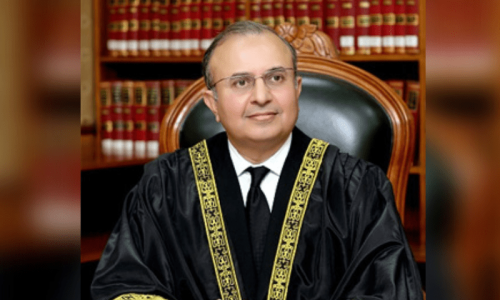CHICAGO, May 19: The Nato’s chief urged Pakistan on Saturday to back efforts to stabilise Afghanistan as President Asif Ali Zardari arrived in Chicago to attend a Nato summit which aims to finalise a transition plan for the war-torn country.
Leaders from 61 countries, including the US, Pakistan and Afghanistan, are attending the May 20-21 conference in US President Barack Obama’s hometown, Chicago.
Although no bilateral meeting between President Obama and President Zardari is on the card, media representatives were seen speculating about a trilateral meeting, which may include their Afghan counterpart Hamid Karzai.
US Defence Secretary Leon E. Panetta, meanwhile, told L.A. Times that he planned to confront Pakistan over what he considered price gouging for transport of supplies to Afghanistan and hoped for a ‘consensus’ among allies over the war effort.
Mr Panetta ruled out paying Pakistan $5,000 for each truck carrying supplies across its territory for Nato troops in Afghanistan. Pakistani officials have demanded that amount as a condition for reopening supply routes that have been closed to the alliance since fall.
“Considering the financial challenges that we’re facing, that’s not likely,” Mr Panetta said of the demand.
But Pakistani officials say that their schedule does not include a Panetta-Zardari meeting, which further strengthens the possibility of trilateral talks, although both US and Pakistani official say that no trilateral meeting is planned either.
“We can’t solve the problems in Afghanistan without the positive engagement of Pakistan,” Nato Secretary General Anders Fogh Rasmussen said at a policy forum in Chicago.
He also referred to the alleged terrorist safe havens in Pakistan’s tribal areas and said Nato was looking forward to work with Pakistan to eradicate those bases.
“We have to solve these problems,” he said.
Mr Rasmussen, who is scheduled to meet President Zardari on Saturday evening or early Sunday, said he would “convey a couple of clear messages” to the Pakistani leader. He did not elaborate the messages.
But the dispute that almost prevented Pakistan from attending the summit – reopening of Nato supply routes – remains unresolved.
The US media quoted American officials as saying that it’s still not clear if Pakistan would formally announce reopening of the routes during the summit.
Pakistan closed the routes after the Nov 26 US raid on a Pakistani military post killed 24 soldiers, demanding an apology over the incident.
By last week it was clear that the apology was no longer a precondition for reopening the routes, although Pakistan still wants the United States to apologise.
The change in Pakistan’s position happened when Nato made it obvious that unless it agreed to reopen the routes, Islamabad would not be invited to a conference which would have a direct bearing on its security as well.
Pakistan has allowed four supply trucks to cross into Afghanistan this week but the concession is seen in the US as “too little, too late.”
And federal Interior Minister Rehman Malik also has clarified that the gesture should not be interpreted as the resumption of Nato supply routes.
Media representatives from Nato countries were seen asking officials what caused the alliance to invite President Zardari when Pakistan has not yet reopened the supply routes.
Journalists hint at the possibility of a secret deal which, they say, President Zardari may announce during the summit.
But both Pakistani and US officials say that “there’s no secret deal” and that the Pakistanis have agreed in principle to reopen the routes but “a deal is not done until it is done,” as State Department spokesperson Victoria Nuland said.“We are looking at a conversation which is a very positive,” Pakistan’s ambassador to the US, Sherry Rehman, told CNN while talking about US-Pakistan talks on this and other issues.
“We have been negotiating things that are trying to operationalise an agreement, a memorandum, perhaps, that can be transparent,” she said.
Pakistan has its demands too, which, besides the much-sought after apology, includes an immediate halt to drone strikes in Fata.
Ambassador Rehman, while talking to Dawn, said this was not the forum to discuss drones but all aspects of the reopening of routes issue would be discussed.
Pakistan, she said, wanted to continue to work with the US and Nato in the war against terror but it cannot be rushed into taking decisions.
US officials, while briefing the media, said President Obama would discuss with world leaders plans to gradually hand over security control to Afghan forces and pave the way for the withdrawal of 130,000 foreign combat troops by late 2014.
Nato hopes Afghanistan’s security forces, which will grow to 352,000 later this year, can take the lead throughout the country next year.
The alliance will also use the summit to reassure President Karzai that Nato would fund his security forces and continue training beyond 2014.
“Let me be clear,” Mr Rasmussen said. “Nato will continue to stand shoulder to shoulder with Afghanistan.”











































Dear visitor, the comments section is undergoing an overhaul and will return soon.